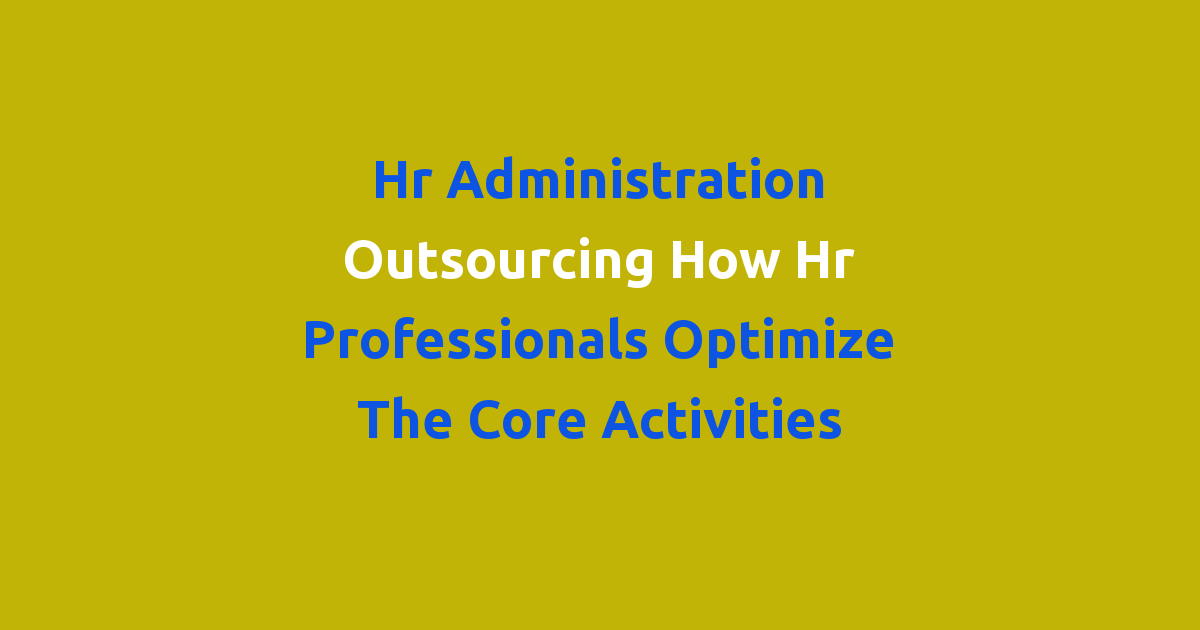Outsourcing HR administration allows HR professionals to enhance the effectiveness of core activities.
Introduction
Human Resource (HR) administration is a crucial function in any organization, responsible for managing personnel, recruitment, payroll, and other related activities. With the increasing complexity of HR tasks and the need for specialized skills, many companies are now opting to outsource their HR administration to third-party service providers. This paper explores how HR professionals can optimize core activities through outsourcing and proposes a new system for efficient HR administration.
Problem Statement
Traditional HR administration is often time-consuming and resource-intensive, requiring HR professionals to juggle multiple tasks simultaneously. This can lead to inefficiencies, errors, and lack of focus on strategic HR initiatives. With the current business landscape becoming more competitive and fast-paced, companies need to find ways to streamline their HR processes and increase productivity. Outsourcing HR administration presents a solution to this problem, allowing organizations to offload routine tasks to specialized service providers and free up their HR professionals to focus on more strategic activities.
Existing System
In the traditional HR administration system, HR professionals are responsible for managing a wide range of tasks, including payroll processing, employee benefits administration, recruitment, training, and compliance. This can be overwhelming and time-consuming, leading to burnout and errors. Moreover, HR professionals may not have the specialized skills and technology required to efficiently manage these tasks, resulting in inefficiencies and compliance risks.
Disadvantages
There are several disadvantages to the traditional HR administration system. These include:
1. Time-consuming processes: HR professionals spend a significant amount of time on routine administrative tasks, limiting their ability to focus on strategic HR initiatives.
2. Lack of expertise: HR professionals may not have the specialized skills and technology required to efficiently manage complex HR processes, leading to inefficiencies and errors.
3. Compliance risks: With ever-changing labor laws and regulations, ensuring compliance can be challenging for HR professionals who are not well-versed in legal requirements.
4. High costs: Maintaining an in-house HR team can be costly, especially for small and medium-sized businesses with limited resources.
Proposed System
To address the limitations of the existing HR administration system, we propose outsourcing HR administration to specialized service providers. By partnering with third-party HR vendors, organizations can leverage their expertise, technology, and scale to streamline HR processes and optimize core activities. The proposed system will involve delegating routine HR tasks such as payroll processing, benefits administration, and recruitment to external providers, allowing internal HR professionals to focus on strategic initiatives and value-added activities.
Advantages
There are several advantages to outsourcing HR administration. These include:
1. Cost savings: By outsourcing HR tasks, organizations can reduce the overhead costs associated with maintaining an in-house HR team, including salaries, benefits, and training.
2. Expertise: Third-party HR vendors have specialized skills and technology to efficiently manage HR processes, reducing errors and improving compliance.
3. Scalability: Outsourcing allows organizations to scale their HR operations up or down based on business needs, without having to hire or lay off internal staff.
4. Focus on strategic initiatives: By offloading routine tasks to external providers, internal HR professionals can dedicate their time and resources to strategic HR initiatives that drive business growth and innovation.
Features
The proposed system for outsourcing HR administration will include the following features:
1. Payroll processing: Third-party vendors will handle payroll processing, including calculations, deductions, and tax filings, ensuring accuracy and timeliness.
2. Benefits administration: External providers will manage employee benefits administration, including enrollment, claims processing, and compliance with regulatory requirements.
3. Recruitment: HR vendors will assist in recruitment efforts, sourcing candidates, conducting interviews, and onboarding new hires, to ensure a seamless and efficient hiring process.
4. Compliance management: Third-party vendors will stay up-to-date on labor laws and regulations, ensuring that organizations remain compliant with legal requirements and avoid costly fines.
Conclusion
In conclusion, outsourcing HR administration is a strategic approach for optimizing core activities and increasing efficiency in organizations. By delegating routine tasks to specialized service providers, HR professionals can focus on strategic initiatives that drive business growth and innovation. The proposed system for outsourcing HR administration offers several advantages, including cost savings, expertise, scalability, and a focus on strategic initiatives. Overall, outsourcing HR administration presents an opportunity for organizations to streamline their HR processes, improve compliance, and enhance employee satisfaction.

